In 20 years time, will Taiwanese men be unable to find wives? An abnormal excess of male over female births in recent demographic statistics is causing many people to be concerned that in future, men will be hard put to find a mate. Others joke that families with daughters will be in great demand. But is "Adam being unable to find Eve" the only worry which the imbalance between male and female births should raise?
In September of last year, before the UN Women's Conference in Beijing, the US magazine Newsweek ran a report on women in Asia. It stated that in many Asian countries, including Taiwan, attitudes of male superiority are deeply rooted, particularly in regions socially influenced by Confucianism and by the traditional notion that "there are three ways to be unfilial, and the worst is to be without issue." In these societies, the report said, there are frequent cases of female infanticide, and of female fetuses being aborted after their sex is determined by medical tests. This is creating an unnatural imbalance in the ratio of male to female babies.
Without the interference of non-natural factors, the ratio of boys to girls at birth generally stays at roughly 105:100. But because the death rate during childhood is slightly higher for boys than for girls, by adulthood the numbers of men and women are very close. According to statistics from the Taiwan Provincial Institute of Family Planning, births in Taiwan stayed at this natural ratio for 30 years after post-war records began in 1955. But in 1987 the figures began to change, and in 1990 the ratio of boys to girls reached 110:100--the proportion of boy babies was up by some 5% over normal.
Looking around Taiwan after its rapid industrialization, attitudes of male superiority are far less pronounced today than in the past. According to sociological research there are more and more families in our society with only daughters, or which are supported by daughters. But why should an imbalance between male and female births appear now? Is it really as Newsweek said: that notions of male superiority and the desire to continue the family line are still deeply entrenched?
A million for a boy, half a million for a girl
The need for manpower is generally seen as the main reason for boys being preferred over girls in agricultural societies. United Nations statistics confirm that in the highly industrialized countries of Europe and North America, in the absence of ex-traneous factors such as war, the ratio of male to female births has generally maintained the natural balance.
Taiwan too has industrialized, and practical considerations such as wanting heirs for family businesses or the need for manpower have lost much of their importance. Jeh-hang Lai, a research fellow at Academia Sinica's Sun Yat-sen Institute for Social Sciences and Philosophy, believes that under the influence of the Chinese traditional concept whereby a family's descendants of the same surname burn incense to their ancestors and carry out the rituals of ancestor worship, it is unlikely that people's hopes that their progeny will respect and venerate them will die out in the short term. Hence in Taiwan in the 1990s there really are still daughters-in-law who are rewarded with NT$1 million if they give birth to a son, but only NT$500,000 if they bear a daughter.
In fact, no matter what the level of industrialization, superior status is accorded to males in all of today's major cultures, and the differences are only of degree.
Even in the highly industrialized West, a preference for boy babies still persists. Records kept by European clergy reveal how in pre-industrial Europe there were cases of peasants keeping boy babies but killing girls, and today the custom of hanging a pair of trousers at the left side of the bed in the hope of conceiving sons still survives. Professor Chang Sheng-ping, director of the Department of Obstetrics and Gynecology at Taipei's Veterans' General Hospital, notes that the sperm separation technique used in clinics to select the sex of fetuses was first invented and patented in the USA as a method of gender screening.
Western society is also male dominated and male oriented, but it has no tradition of ancestor worship. In the West responsibility for raising children is usually seen as ending at age 18, when they are expected to become independent, and the notion of inheriting family property is less pronounced. Furthermore, with such factors as a longer period of industrialization and the impact throughout society of the women's movement since the 1960s, the degree of sexual bias in the West is naturally much less.
Where have all the daughters gone?
But although the mentality of favoring boys over girls is unlikely to die out, it will not of itself produce an imbalance in the ratio of the sexes without the action of "external factors." Apart from wars and other factors beyond individual control, in agricultural society infanticide was widespread because the scarcity of resources, and girl babies bore the brunt of it. Today in mainland China, on the other hand, it is the pressure of the one-child policy which incites many people to practice female infanticide, and there is a very large imbalance between the numbers of male and female babies (in 1995 the ratio was 114:100).
Taiwan has no compulsory birth control policy, and has a comprehensive household registration system, so female infanticide cannot be used as a way of achieving a family's desire for male children. But in recent years in Taiwan there have been sporadic reports of male children being born with deformities after the use of chorionic villus sampling (CVS) to determine the sex of the fetus. To some degree these incidents back up Newsweek's claim that the skewed ratio of male to female births in Taiwan is caused by people using medical procedures to determine fetal gender, and then aborting female fetuses.
Just how rampant is the practice of fetal gender testing and female abortion in Taiwan? Is it widespread enough to account for the distortion in the birth ratio?
Gynecologist Luo Jen-hua, who holds a patent for a catheter used in transcervical CVS (TC CVS), has said that in three years of performing the procedure (in which cells from the chorionic villi are aspirated out of the uterus through a catheter and tested to determine the gender of the fetus), he has carried it out on over 10,000 women. Since most women who suspect their fetus may have a genetic disorder choose testing by amniocentesis, in most cases when women come for TC CVS it is to determine the sex of the child.
A wolf in sheep's clothing?
Transcervical CVS, transabdominal CVS (TA CVS) and amniocentesis were first used to test for genetic disorders, but the tests also reveal the sex of the fetus. Hence the procedures are now widely used in Taiwan's medical system for gender determination. In fact, the time when an imbalance began to appear in the gender ratio in Taiwan coincides neatly with the time when these techniques were introduced.
Professor Ko Tsang-ming, of the Department of Obstetrics and Gynecology at National Taiwan University Hospital, says that the CVS method of collecting fetal cell tissue for examination was developed overseas around 1979. It has been in general use in clinics and hospitals throughout Taiwan for almost a decade, and it is in this period that the figures for the ratio of male to female births have begun to show a marked distortion.
Ironically, over the past decade the development of TA CVS and TC CVS in Taiwan has been described as technically very advanced. Ko Tsang- ming says that research papers on TC CVS were published in the West more than 20 years ago, but because the technique was found to be less effective for diagnosing genetic disorders than other procedures, in other countries TC CVS remained at the research stage. "But in Taiwan its use has boomed."
We have not only improved techniques for prenatal gender determination, but have also exported these techniques. Ko Tsang-ming describes these techniques as "a wolf in sheep's clothing": gender testing packaged in the cloak of a diagnostic procedure actually comes at the price of girl fetuses' lives and mothers' health.
Transcervical and transabdominal CVS are both carried out before the fetus is fully formed. Apart from an increased risk of miscarriage, the procedures may cause strong uterine cramps, which disrupt blood circulation through the fetus's extremities. This may lead to incomplete development of the fetus's limbs.
In September last year, the case was reported of a couple who had wanted their first child to be a boy, and had used TC CVS to determine the gender of the fetus. They had been happy to learn that the baby would be male, but he was born with malformed limbs. The parents believed their child's limbs had been "washed away by TC CVS [which is popularly called 'womb rinsing' in Chinese]," and they brought a lawsuit against the physician who had performed the procedure.
Due to safety concerns, doctors are hesitant to perform CVS. But the situation is different with sperm separation, which is used to select gender before conception (by separating male "Y" sperm from female "X" sperm for artificial fertilization). The medical profession uses this technique with righteous enthusiasm, because it obviates the need to get rid of female fetuses. Sperm separation was developed in the USA in the 1970s and can be used to prevent many gender-related hereditary disorders. But the technique only raises the proportion of male fetuses to 70%, so it is not widely used for gender selection.
In the ROC however, "there are too many people doing sperm separation." Ko Tsang-ming says it is an open secret among gynecologists that the technique is a big money-spinner for physicians in private practice. But few doctors are willing to point out that sperm separation is not actually 100% effective for gender selection, for fear of harming their colleagues financially.
Whom does the law protect?
Although gender selection is big business in our society, gender testing and abortion are very private matters, so it is not easy to determine how widespread they are. But Associate Professor Liu Chung-tung of the National Defense Medical Center believes there are two factors which are indicative of how serious the problem is: "The sex ratio for third-born children is skewed by as much as 30%," and "there is a steady stream of cases of boys with birth defects caused by TA CVS and other procedures."
Because there is a fifty-fifty chance of gender testing procedures showing that the fetus is male, and because not all parents decide to abort female fetuses after testing, today's gender ratio figures do not reveal the full extent of society's anti-female bias. Nor are the reasons behind such bias something which can be explained by statistics.
Associate Professor Chang Chueh, coordinator of the Women's Research Program in the Population Studies Center at National Taiwan University, believes that to put it bluntly, this is due to a failure of education on the relationship between the sexes. Today, says Regina Wu, a supervisory director of the Warm Life Association for Women, our legal, educational and other systems still protect men. She also says that of course there is a causal relationship between the general preference for boys and the fact that the whole of the way society is organized is still weighted against the female sex.
It was not until last year that the Council of Grand Justices interpreted as unconstitutional a 60- year-old clause in the Civil Code which stipulated that "mother and father shall exercise parental rights over children jointly, but where their opinions differ the father's wishes shall take priority."
Society constantly tells women that their place and their fulfillment are in the home. But the home and marital relationships are full of injustice for women, and this is also why women's groups have been lobbying hard in recent years for changes to the family law section of the Civil Code, which regulates relations between husbands and wives, and parents and children.
Modern mothers, old values
An amendment on the inheritance of surnames has already passed first reading in the Legislative Yuan. In future, which surname a child takes can be agreed jointly by its parents. But Regina Wu feels, on the basis of her contacts with members of the legislature, that "it cannot be denied that many legislators compromised as a sop to female voters--in fact they don't agree with the idea of a child being able to take its mother's surname."
In December last year, the Ministry of Justice held a press conference at which it asserted that because public opinion polls had shown that 60% of people are still in favor of a child taking its father's surname, the Legislative Yuan will be going against the public's wishes if it passes the amendment into law. Regina Wu comments that if this is really so, under a system of joint decision by parents, these 60% could still choose the father's surname.
From the perspective of people working actively to promote equal rights between the sexes, changing the law is not the most difficult part. The biggest obstacle to achieving equality is the patriarchal clan system which has been in place for thousands of years. For instance, although the Civil Code does not bar females from inheriting property, many families demand that their daughters sign away their inheritance rights when they marry.
The Warm Life Association often comes into contact with divorced parents involved in disputes over the guardianship of their children. "If the child is a boy, the father is sure to fight hard for custody, but if it is a girl they are more willing to relinquish their rights," says Regina Wu, commenting that this is probably because fathers are afraid of their sons taking other surnames.
Old values cause problems for many so-called "modern women" too. If they give birth to a girl, they will constantly hear encouragement from all around them to have a second child. In postnatal rest centers, where some mothers spend the traditional month of rest after giving birth, women whose second child is also a girl receive markedly fewer family visits than if it is a boy; if the child is a boy, the mother-in-law is happy, and the woman's own parents breathe a sigh of relief on their daughter's behalf.
The year before last in Taipei there was an incident in which a woman working as a domestic help killed the wife of the family she worked for and abducted their baby son, telling her husband's family that the child was her own. Gynecologists can also attest to the great pressure that many women are put under by the old expectation that they should bear sons.
Ko Tsang-ming, who objects to colleagues' use of diagnostic procedures for prenatal gender testing, says that probably all gynecologists have come across women who fear that if they do not give birth to a son, their marriage might end in divorce and a broken home. He believes that some doctors perform gender testing out of sympathy for women who believe they will not be able to bear the consequences of having another girl, not out of any intention to upset the balance of male to female births.
Chang Sheng-ping, who is also president of the ROC Association of Obstetrics and Gynecology, estimates that for every hundred patients who say they want to have a boy, there are only two or three who specifically want a girl. Of patients of all backgrounds attending Taipei's Veterans General Hospital for fertility treatment, 90% say, when asked, that they want a son.
The invisible one-child policy
To women's rights groups and to doctors it appears that in Taiwan the social pressure to have sons is still very strong. But Associate Professor Yu Te- hui of the Institute of Ethnic Relations and Culture at National Donghwa University takes the view that the people medical practitioners come into contact with are those with special requirements for their children's gender, and this has a magnifying effect. If one really looks at the population as a whole, then as Taiwan has industrialized, attitudes about continuing the family line and ancestor worship have inevitably weakened throughout society, and the certain trend for the future is for gender to no longer be very important.
Chen Hsin-mu, an associate professor of sociology at National Chengchih University, also feels that on hearing of the imbalance between male and female births we should not jump to criticize patriarchal society, or blame it on ancestor worship, because the explanation is not simply a question of sexual inequality.
Thirty years ago, attitudes of male superiority were certainly far stronger in Taiwan than today, but at that time average family size in Taiwan was five children. With large families, the probabilities given by a natural gender ratio of 105:100 meant that one would be almost sure to have a boy sooner or later, and both boys and girls had pretty much even chances of being born. But in Taiwan today, not only does the government recommend that "two children is just right"; many families find that if only one parent works, their income will be far from enough for the family to live on. Yet society is not supportive enough of families where both parents go out to work.
"As our society becomes more open, people are less bothered about other people's reproductive and marital choices," says Chen Hsin-mu, but coercive structural forces in society are more powerful: "The cost in money and time of raising and educating a family is so heavy that it reduces the scope for flexibility in family size. Thus just as in mainland China, there is no scope for having extra children."
This is one of the reasons why Taiwan's birth rate has fallen in a very short period to a level similar to those found in Northern Europe--less than two children per family. This is below the rate in the USA.
Many young couples, faced with a variety of pressures from which they cannot escape, can only have one child, and when they want that child to be a boy, in our highly educated, high-income, low- birth-rate society this actually creates pressure to have a boy at the first try.
The shift in the sex ratio at birth in recent years has affected urban and rural areas more or less alike, and in 1990 the ratio of boys in Taipei City was actually higher than the islandwide average. Chang Ming-cheng, director of the Taiwan Provincial Institute of Family Planning, surmises that this phenomenon, which flies in the face of the belief that traditionally in the countryside people attach more importance to rearing sons, "may have to do with the fact that in the cities, people have easier access to, and are more aware of, gender testing techniques."
Professor Yang Kuo-chu of NTU's psychology department sums up the situation by saying that in the West, demographic change and equal rights for women have developed over a relatively long period, whereas in Taiwan demographic change has been compressed into a short timeframe, and it is difficult for traditions of male preeminence and of continuation of the male family line to disappear so quickly. These factors, combined with the timely appearance of techniques for determining fetal gender, probably provide the best explanation for the imbalance between male and female births.
Caused by hepatitis B?
Many academics believe that in Taiwan, which does not have a compulsory one-child policy like mainland China, the figures will sooner or later return to normal as industrialization continues at a swift pace, women perform as well as men in the workplace, people's insistence on continuing the male line lessens, and laws are amended to be fairer to women.
Indeed, if we let the figures speak for themselves, compared with mainland China and South Korea where the ratio of male to female births has been out of balance for a decade, in Taiwan the shift in the figures has only been present a few years, and since 1990 there have been signs of a return to normal, with the ratio falling to 108:100.
Some believe that the fall in the ratio in the last two years is due to many people being "scared off" using gender tests by frequent media reports over recent years of cases of male children born with limb defects following gender screening procedures.
But Professor Chen Kuan-cheng of National Chung Cheng University says that a longer period of observation is still required before we can establish whether the distortion in the birth ratio in Taiwan is indeed caused by parents aborting female fetuses after gender testing.
Chen Kuan-cheng, who has surveyed overseas research extensively, says that there have been claims in foreign research papers that type B hepatitis can cause a rise in the proportion of male births. Taiwan is an area with a high incidence of hepatitis B infection, so "unless we can rule out the external factor of public health, I'm afraid it is too soon to conclude that the distortion in the birth gender ratio which has appeared in recent years is the result of human preference."
Sadly, medical researchers have not investigated further into how disease might affect the birth ratio, nor is there any broad epidemiological research data to verify whether the situation in Taiwan is affected by disease.
Liu Chung-tung, a member of the Feminist Scholars' Association, also admits that women's groups tried to make an issue of the birth ratio figures in the hope that society would broadly discuss women's rights issues and take them seriously. But the trend of a gradual return to normal in the figures made it difficult to get people to perceive it as serious.
This trend is also the reason why most researchers are not worried that in 10 or 20 years' time, the small imbalance shown by today's figures will distort the marriage market enough to create social problems. This is particularly because the marriage market has subtle self-regulating abilities: not only is there flexibility in the age at which people marry, but with today's increasing numbers of divorced, remarried and single people, marriage has broken away from its traditional form, and concern that future Adams will find no Eve seems unnecessary.
In fact the exact ratio of male to female births is not what is important. Scholars believe that a question even more worth discussing ought to be why, in a society which calls itself modern and prides itself on having created an economic miracle, the phenomenon of using prenatal diagnostic testing to determine fetal gender and then aborting female fetuses should exist at all. For if we attack mainland China's one-child policy for producing infanticide, how is this practice different from what happens on the mainland?
The wrong sex
Ni Chia-chen, general secretary of the Awakening Foundation, believes that it shows that many members of the female sex do not even get a fair chance for the right to exist. "If women don't even have the basic right to life, what's the point of talking about the right to work or the right to inheritance?"
For a defenseless fetus to have to be destroyed simply for being the wrong sex is the height of moral evil. In our society, "this shouldn't even happen once," emphasizes Liu Chung-tung. Furthermore, when medicine controls gender, it is not only the female fetuses which suffer. The baby boy last September who was damaged by TC CVS was rejected at birth by his family, who thought the doctor should take responsibility for looking after him. This shows how in fact baby boys too are just tools for people to fulfill their own desires.
Demographer Hsieh Yu-sheng says that what we should be asking today is why medical techniques are being used for gender selection. Can the government do anything to bolster people's courage to resist social pressure or to make doctors protect life?
To prevent techniques originally intended to screen for genetic disorders being used to choose children's sex, many countries have regulations prohibiting their use for gender testing. Ko Tsang-ming says that American medical journals frequently warn practicing physicians sternly against such practices.
In fact, with reference to existing prenatal diagnostic techniques for genetic disorders, the ROC Department of Health has issued administrative orders warning doctors that conducting fetal gender tests on pregnant women, or performing abortions based on the fetal gender, would make them guilty of malpractice under the Medical Practice Law and the Medical Treatment Law. But there are still gynecology clinics whose signboards blatantly carry such wording as "CVS testing, 100% accurate."
Association of Obstetrics and Gynecology president Chang Sheng-ping says frankly that doctors in the ROC will not encourage infertility patients to use sperm separation to choose the sex of their first child. But if patients already have a daughter, doctors will rarely refuse their requests, and even perform sperm separation for many fertile couples, to make up for their perceived "lack" of a son.
Where are your ethics, Doctor?
Many doctors believe that unless there is a change in society's attitude of valuing men over women, then forbidding doctors to test for fetal gender will only force the practice underground--like abortion in the past, which before it was legalized was passed off as "menstrual cycle regulation." "If the doctors have the techniques and there is pressure on expectant mothers, a market is naturally there," Ko Tsang-ming believes.
Although it cannot be denied that social realities create pressure for individual families, in the doctor- patient relationship in Taiwan, doctors enjoy a great deal of authority. They naturally ought to shoulder the responsibility of breaking down mistaken ideas of male superiority.
In Liu Chung-tung's view, punishment is not the way to solve the problem--this is a question of medical ethics. The task of building ethics has long been neglected in our medical community. People are quick to use technical apparatus, but related moral principles are neither discussed nor applied.
Liu Tan-kui, a section chief in the Department of Health's Public Health Bureau, says that for the law to be enforced, people must register complaints. But the medical profession is already working "in collusion" with the public, and in cases prosecuted in the past it was only after disputes arose about the treatment that real evidence emerged on which basis doctors could be punished.
If even gynecologists, the doctors most concerned with reproduction, are not willing to break down ideas of male superiority, then will the ratio of male to female births really return to normal, as sociologists so optimistically believe?
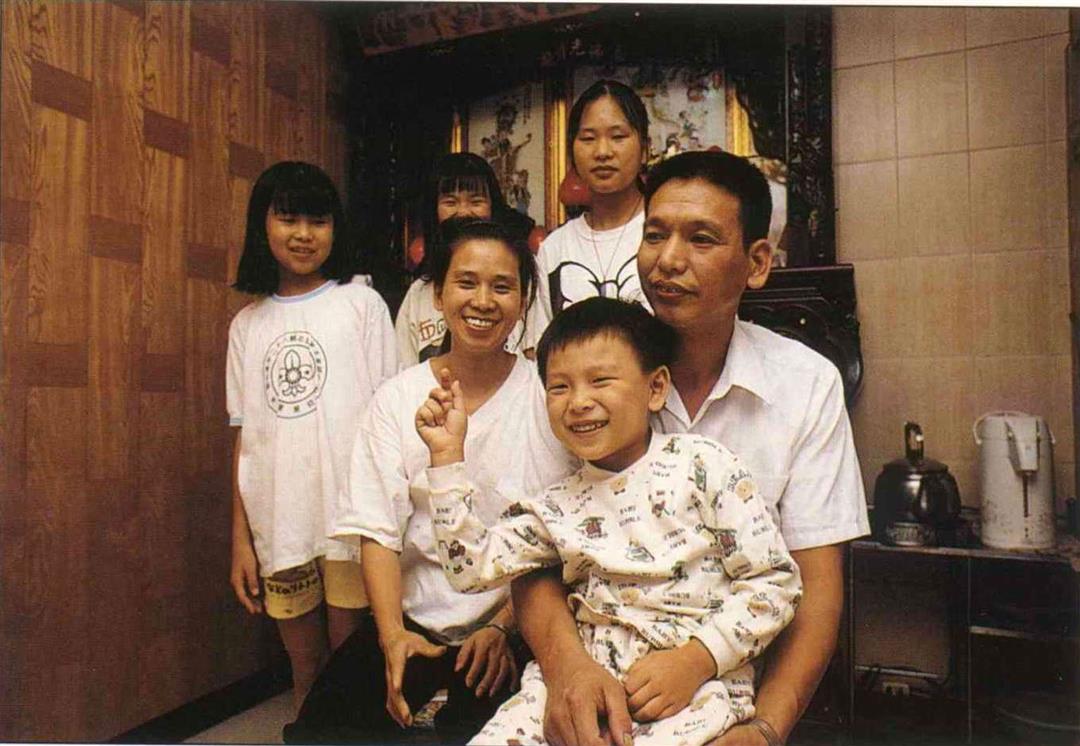
In deference to the older generation's wishes, after three daughters Mr. and Mrs. Yu exerted them-selves again and finally produced a son.
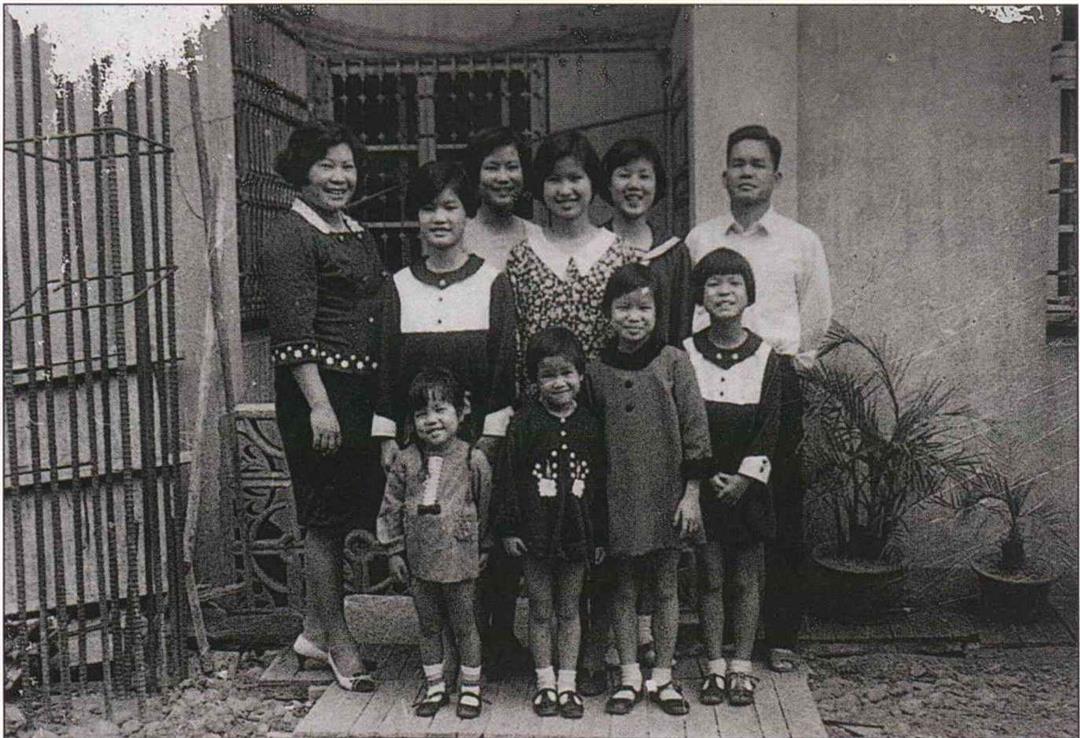
With social change, smaller families, and the use of diagnostic techniques to determine fetuses' gender in the hope of having a boy the first time, families with seven or eight daughters have become a thing of the past. (courtesy of Ms. Huang-Fan Yuan-mei)
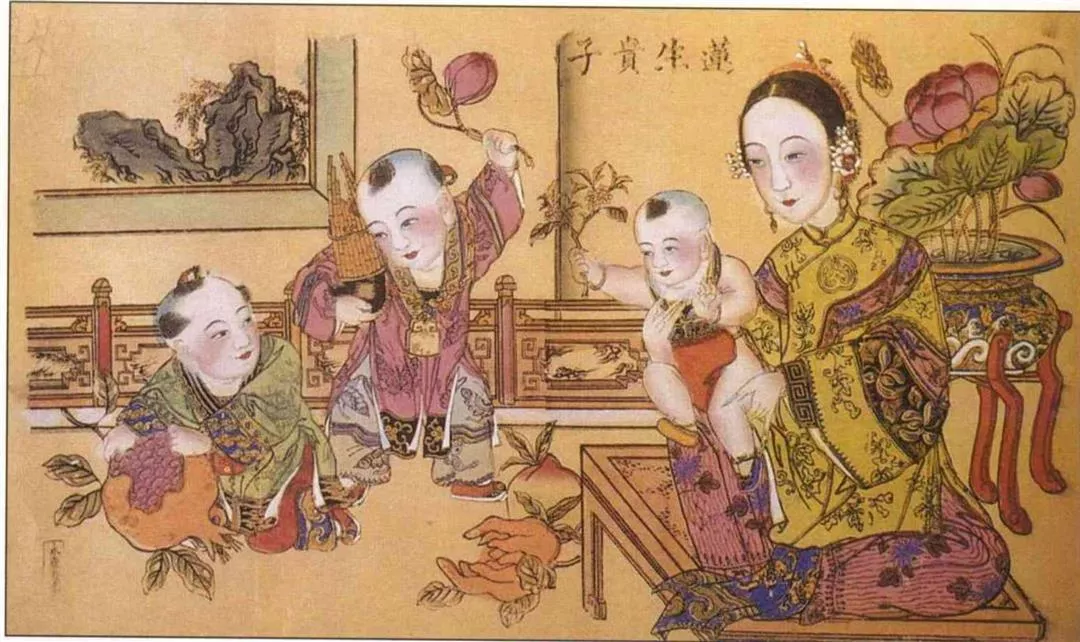
Traditionally, to have a "string of sons" was seen as one of the happies t things that could happen to one in life. But today very few families want even as many as three. (rephotgraphed from Chinese Popular Prints)
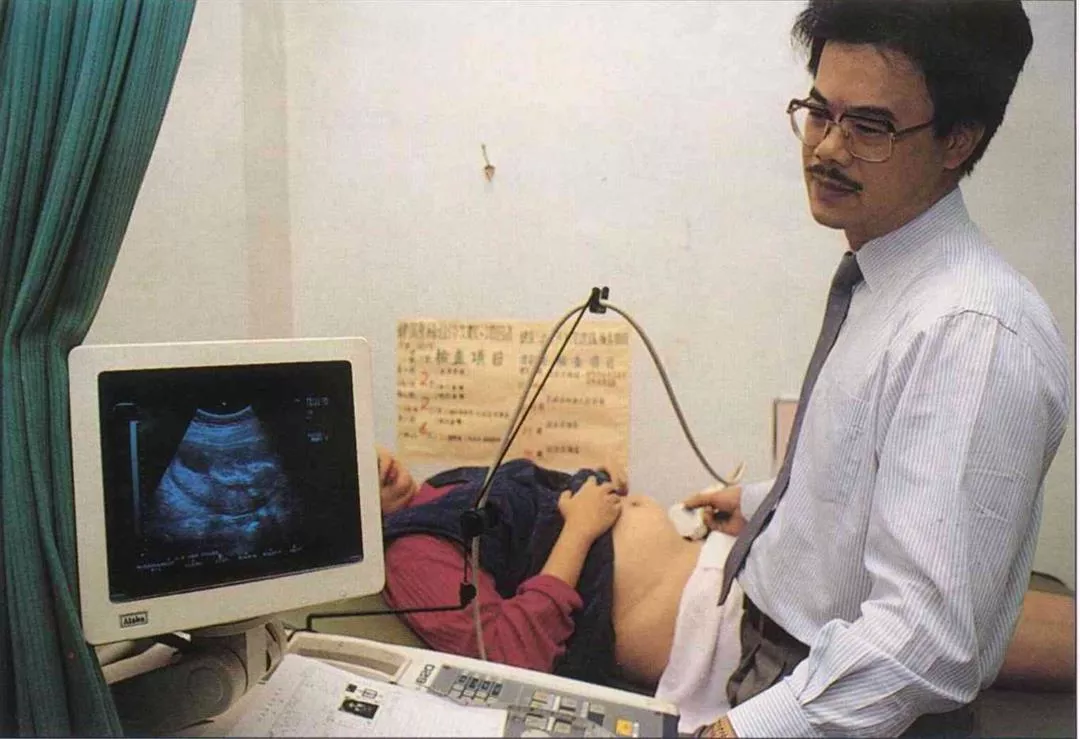
Ultrasound scanners let expectant mothers see how their babies are growi ng. As medical technology advances, medical ethics in Taiwan are in urgent need of improvement.
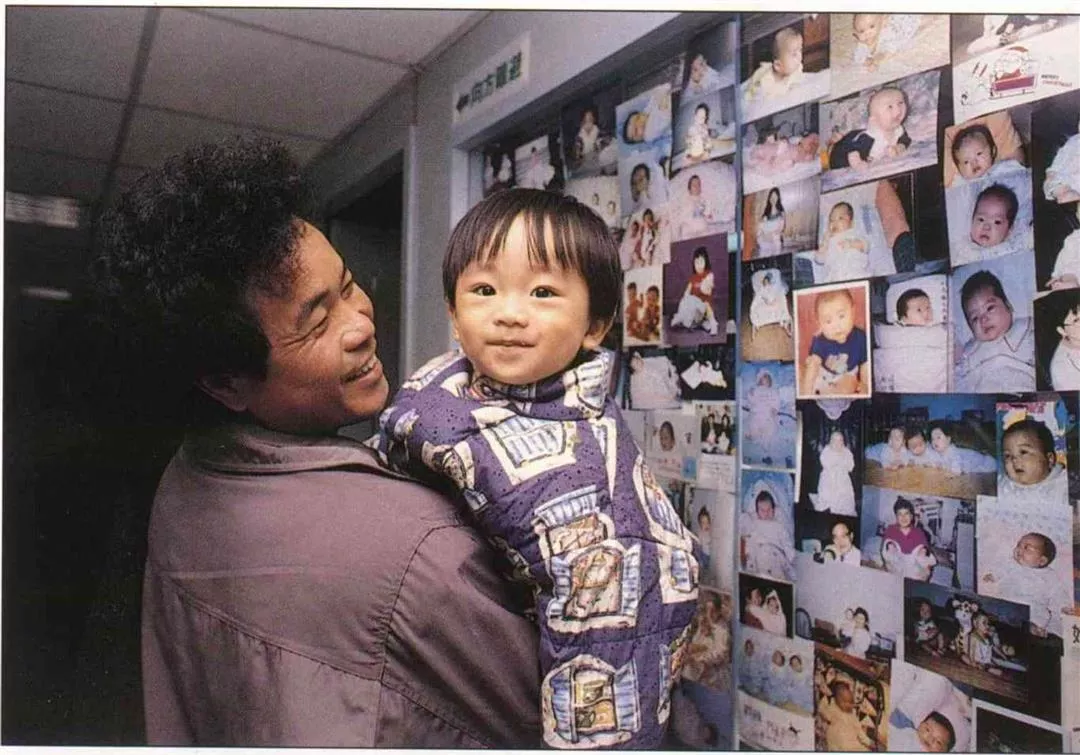
Thanks to technology, infertile couples are blessed with children, and doctors' offices are festooned with photos of test-tube babies. Although infertile couples also have a prefe rence for boy babies, the father pictured here stresses that his son is not a product of gender screening .
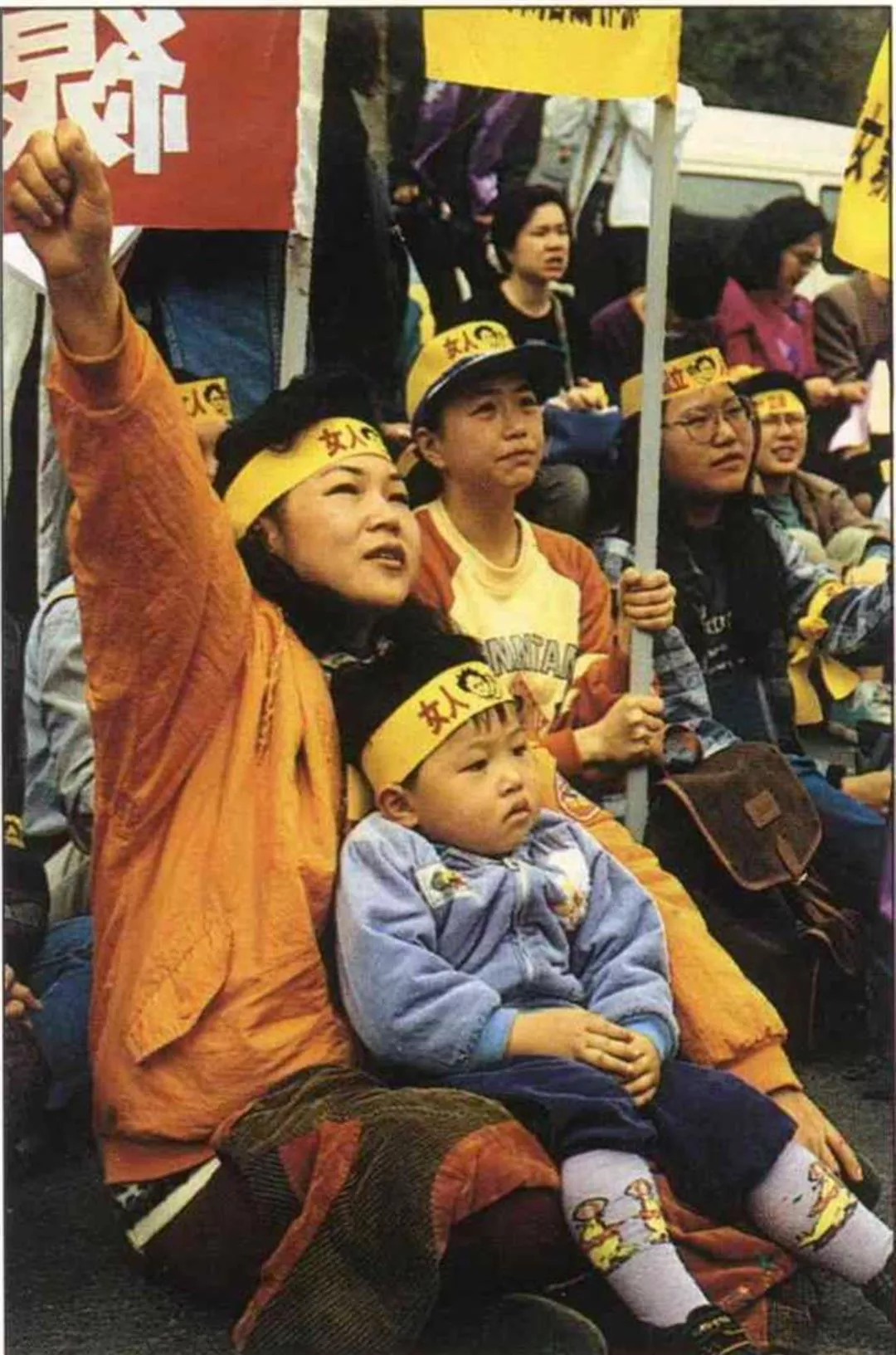
If girls are denied even the right to exist, what's the point of talking about the right to work or inheritance? Our picture shows members of the Awakening Foundation campaigning for equal rights.